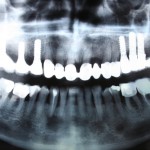
Implant-supported fixed dental prostheses are an effective oral rehabilitation option. They can be cement- or screw-retained on the implant or abutment and each approach has advantages and disadvantages. Previous studies have suggested higher level of peri-implant disease with cemented prosthesis.
The aim of this review was to compare cement- and screw-retained prostheses regarding the incidence of peri-implant mucositis and peri-implantitis.
Methods
A protocol for the review was registered in the Prospero database. Searches were conducted in the Medline/PubMed, Embase, Scopus, Web of Science, OpenGrey (http://www.opengrey.eu) and Grey Literature Report (http://www.greylit.org) databases. Randomised controlled trials (RCTs) in patients aged 18 and above comparing the incidence of peri-implant disease in implant-supported restorations with cemented prostheses with screw-retained prostheses were considered. Two reviewers independently selected studies extracted data and assessed the risk of bias using the Cochrane Risk of Bias Tool for RCTs (RoB 2) with disagreements being resolved by a third reviewer. The main outcomes were incidence of peri-implant disease expressed as pooled risk ratios (RR) with 95% confidence intervals (CIs). The certainty of the evidence was assessed by using the Grading of Recommendations Assessment, Development and Evaluation (GRADE) approach.
Results
- 6 RCTs involving a total of 255 patients (279 implants) were included.
- The studies were carried out in Denmark, Germany, Italy, Spain, and Switzerland between 2002 and 2012.
- Follow up periods range from 2 – 10 years.
- All 6 RCTs had some risk of bias concerns.
- Meta-analysis (4 studies) showed no significant difference between cement- and screw- retained prostheses for the risk of: –
- Peri-implant mucositis, RR = 1.36 (95%CI: 0.42 to 4.38) [moderate certainty].
- Peri-implantitis, RR = 1.00 (95%CI: 0.23–4.31) [moderate certainty].
Conclusions
The authors concluded: –
Moderate certainty evidence suggests that cement- and screw-retained prostheses present a similar risk for peri-implant mucositis and peri-implantitis.
Comments
The authors registered a protocol with PROSPERO and searched a good range of databases. Only 6 relevant RCTs were included with all 6 having some concerns related to risk of bias. The included studies are generally small with only two studies involving more than 50 prostheses. A majority of the studies (4) were conducted in a university setting with the other two being conducted in both university and private practice consequently the findings may not be generalisable. While the findings suggest no difference in the risk of peri-implant disease between the cement- and screw- retained prostheses the findings should be interpreted cautiously because of the limited number of small studies available.
Links
Primary Paper
Reis INRD, Fukuoka GL, Nagay BE, Pannuti CM, Spin-Neto R, da Silva EVF. Incidence of peri-implant disease associated with cement- and screw-retained implant-supported prostheses: A systematic review and meta-analysis. J Prosthet Dent. 2023 Oct 2:S0022-3913(23)00563-2. doi: 10.1016/j.prosdent.2023.08.030. Epub ahead of print. PMID: 37793953.

If no differentiation was made between cements, the review is nonsensical. In any case, it is crystal clear to me (clinical experience, one or two studies, albeit in German) that zinc oxide eugenol cements (Temp Bond, IRM) do not cause periimplantitis, whereas resin cements do. I don’t know anything about Harvard or GIC, but it would be interesting.
Here what you can find in PubMed about peri-implantitis and Temp Bond, confirming, what I have written:
https://pubmed.ncbi.nlm.nih.gov/?term=peri-implantitis+Temp-bond&sort=date&size=100